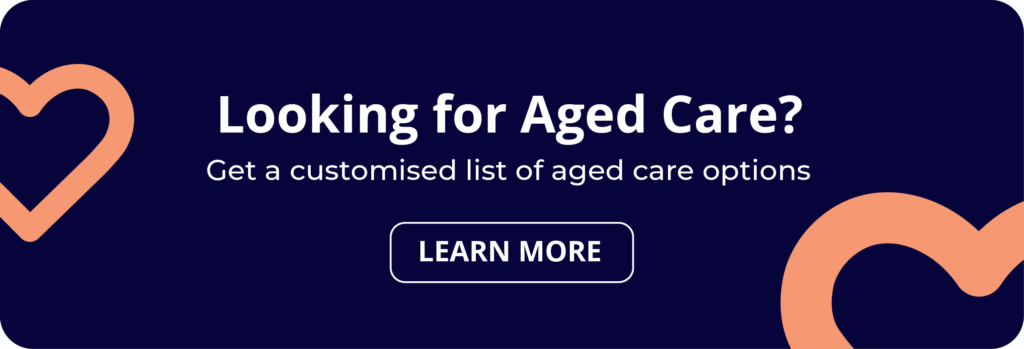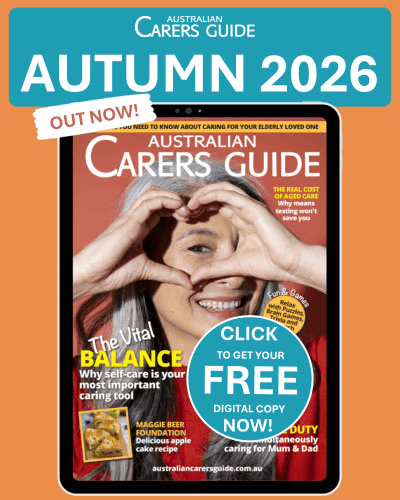Caring for an older family member or friend can be one of the most meaningful things you do. And whether you’re helping with meals, offering emotional support, managing medications, or assisting with daily tasks, the time and energy you give can at times, feel endless. It’s often a role taken on without training, pay, or recognition and it can be exhausting, emotionally draining, and overwhelming, especially if you’re doing it without help.

The good news is, support is available. In fact, many carers don’t realise that help exists for them, too. Whether you’re providing care at home or coordinating aged care services, you don’t have to do it all on your own.
This guide will walk you through the support available to carers in Australia, from financial help and practical services to emotional support and respite options.
Who Is a Carer?
A carer is anyone who looks after a family member or friend who needs help because of age, illness, disability, or mental health concerns. You might be:
- Supporting a parent with dementia
- Helping your partner after a stroke
- Caring for a neighbour who can’t manage alone
You might not think of yourself as a “carer,” but if you regularly support someone with their daily needs, you are one and you are entitled to support.
Practical Help Through My Aged Care
My Aged Care is the Australian Government’s central hub for aged care services and support. It helps older Australians, their families, and carers access the information and services they need to stay independent, safe, and well at home or in aged care facilities.
Through My Aged Care, you can:
- Learn about different aged care services.
- Check eligibility and apply for support.
- Arrange assessments for home care or residential care.
These services are mostly for the older person you care for, but they can in turn, also ease your workload and improve their independence.
1. Commonwealth Home Support Programme (CHSP)
If the person you’re caring for needs low-level support to stay at home, they may be eligible for CHSP. Services may include:
- Meals and shopping
- Cleaning, laundry, and home maintenance
- Help with showering or dressing
- Transport to appointments
2. Home Care Packages (HCP)
If they need more regular or complex support, a Home Care Package can provide funding for services such as:
- In-home nursing or personal care
- Allied health support (like physio or podiatry)
- Equipment and modifications
- Respite services for carers
To get started, call My Aged Care on 1800 200 422 or visit myagedcare.gov.au. They will arrange an assessment to work out what support the person you care for needs.
**Note: HCP will be replaced with the new Support at Home system coming into effect from 1 November 2025.
Support for You as a Carer
You may be eligible for help in your own right, even if the person you care for already receives aged care services.
1. Carer Gateway
Carer Gateway is a national service that provides free support for carers. You can access:
- Counselling
- Carer coaching and skills courses
- Emergency respite care
- Help planning for future care needs
- Peer support groups
Call Carer Gateway on 1800 422 737 or visit carergateway.gov.au. You will be connected with a local provider who can guide you through available options.
2. Respite Care
Respite gives you a break from caring, which is important for your own health. Options include:
- Someone coming to the home for a few hours
- Day centre visits for the person you care for
- Short stays in residential aged care
At Aged Care Decisions, we make it easy for families to find the right respite care when they need it most, whether it’s for a short break, emergency relief, or time to recharge.
Save time and energy by letting us know your needs. Our friendly, experienced team will send a tailored report within 20 minutes. Get started here.
3. Counselling and Support Groups
Looking after someone can be isolating, especially if they have dementia or other similarly complex needs. Speaking with a counsellor or joining a carer support group can make a real difference. Many organisations offer free services, either online or in person.
Examples include:
- Dementia Australia
- Minds Matter Carer Services
- Carers NSW, VIC, QLD, etc. (State-based carer organisations)
Financial Help for Carers
Caring can impact your ability to work or earn income. If you are providing regular care, you may be eligible for Centrelink payments.
1. Carer Payment
This is an income support payment for people who can’t work full-time because they are providing ongoing care for someone. It is means-tested.
2. Carer Allowance
This is a smaller payment, not means-tested, for carers who provide daily care and support. You can receive this on top of other payments or income.
You can apply for both through Centrelink at servicesaustralia.gov.au, or by visiting a Services Australia office.
3. Other Financial Support
Depending on your situation, you may also qualify for:
- A Carer Supplement paid once a year
- The Energy Supplement to help with household costs
- Rent Assistance or help with medical costs if you’re on a low income
It’s worth speaking to a Centrelink Financial Information Service officer or using the online payment guides to check what you’re eligible for.
Support for Working Carers
If you’re trying to juggle work and caring, you’re not alone. Many carers also have jobs, and it can be stressful.
You have the right to:
- Ask for flexible work arrangements, like working from home or changing hours
- Take paid or unpaid carer’s leave (check your award or agreement)
- Access Employee Assistance Programs (EAPs) if your employer offers one
Talk to your manager or HR department about what support they can offer.
Caring for Someone with Dementia
Many older people live with dementia, which can make caring more complex. It’s important to have support and education.
Dementia Australia offers:
- Free information sessions and courses for carers
- Support groups and online forums
- A 24/7 Dementia Helpline: 1800 100 500
- Practical tips for daily care and managing behavioural changes
Learning more about the condition can help reduce stress and make daily life easier for both you and your loved one.
Taking Care of Yourself
It’s easy to forget about your own needs when you’re focused on someone else, but your health matters too. After all, you cannot pour from an empty cup.
- Make time for regular breaks, even short ones
- Stay connected with friends or support groups
- Don’t be afraid to ask for help
- Use services like counselling, coaching, or respite care
Looking after yourself is not selfish. It helps you continue to care better for someone else in the long-term.
Where to Start
If you’re not sure where to begin, here’s a simple step-by-step guide:
- Call Carer Gateway on 1800 422 737
They’ll ask a few questions and connect you with local services. - Register with My Aged Care
Call 1800 200 422 or visit myagedcare.gov.au to organise a support assessment for the person you care for. - Check Centrelink payments
Visit servicesaustralia.gov.au or speak to someone in person at a Centrelink office. - Talk to your GP
Your doctor can help with referrals, carer health checks, and mental health care plans.
Caring for an older person is an important role, and it often comes with emotional, physical, and financial pressures. But you don’t have to do it alone. There is help available across Australia, from respite and payments to counselling and practical support.
If you are caring for someone, it’s okay to ask for support. In fact, it’s one of the best things you can do for both of you.
You are not just a carer. You are valued, and support is here when you need it.
Our fast, FREE and independent aged care services may be just what you’re looking for if you’re a carer in need of support and guidance. Our friendly, highly trained and experienced team are here to help you at every stage. Reach out and connect with us here.
Here’s how our FREE service works:







